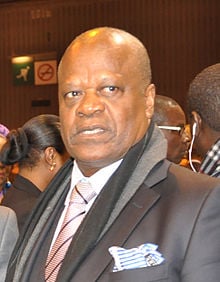Reducing Emission from Deforestation and Land Degradation commonly known as REDD+ has been touted as an effective climate mitigation tool capable of offering tropical countries financial support in return for halting rapid deforestation rates.
But in the Republic of Congo, located in the Congo Basin, politicians are seemingly not buying the economic rational unpinning this concept particularly with respect to providing immediate economic solutions to lift populations and communities out of excruciating poverty.

Henri Djombo, Minister of Forest Economy and Sustainable Development in the Republic of Congo (Brazzaville)
Congolese Environment Minister, Henri Djombo told a high-level gathering of donors, government Ministers of the Congo Basin, conservation and UN organizations here at Le Bouget, venue of the 2015 UN Climate Talks that, without enough financial resources, it is becoming increasingly challenging to sell REDD+ as a viable climate mitigation option in Africa and in the Congo Basin region to be more specific.
“We had a debate in our cabinet meeting following the presentation of a 250.000 Hectares palm oil expansion project. As the environment minister, I argued that, palm oil does not belong to forest areas of the Republic of Congo. In addition, I argued that we had commitments under REDD+, central to which is the conservation of forest. While I provided what I considered convincing, sustainable and long-term benefits of protecting forests, my colleagues were unconvinced,” said Minister Djombo.
“And the only reason why I lost this debate is not necessarily because my colleagues do not understand the long-term benefits of protecting forest, it is essentially because from an economic perspective, the palm oil project promised immediate solutions facing the country such as employment and directly contributing to both local and national economic growth. Thus I lost the debate.”
Failures observed in the Clean Development Mechanism, a carbon trading system designed to allow tropical countries to engage on a green growth path while protecting forest and the underfunding of REDD+ since the idea was first discussed in the UN Climate talks in 2007 has considerably eroded faith in the process, experts say.
“So far the finances offered by REDD+ are really insignificant. A $5 carbon price is nothing compared with other traditional development opportunities in forest areas. So we are trying to combine approaches for generating resources—domestic funding, development assistance, as well as results-based REDD+ payment,” says Yitebitu Moges Abebe, National Coordinator of REDD+ Program in Ethiopia.
The European Union, France, Germany, Norway, and the United Kingdom have so far pledged about USD 500 Million to support the fight against deforestation in the Congo Basin under the Central African Forest Initiative (CAFI). It was launched September 29 during the United Nations Sustainable Development Summit in New York.
To some major actors in the Congo Basin, this figure represents little: “USD 500 million represents nothing,” says Minister Djombo.
At the ongoing climate talks in Paris, Central African and African countries as well as civil society groups have generally demanded for new and additional funding to not only adapt to the effects of climate change but also effectively implement initiatives designed to mitigate climate change effects.
“The activation and further capitalization of the Green Climate Fund should ensure it is a recipient-driven, community sensitive, publicly-funded and controlled body that is transformative and that provides no support to fossil fuel or other harmful energy projects,” the African civil society states in declaration submitted to the United Nations Climate Agency.
Beyond funding, REDD+ faces many other challenges, experts argue.
“How do we save REDD+? Always a brilliant idea for combining conservation and mitigation ambitions, well nurtured by the multilateral system to date. Now we have a combined challenge of uncertain returns on the carbon investments, complicated engineering of REDD+ actions, and a complex policy context with multiple priorities,” says Peter Holmgren, Director General of Indonesian-based Center for International Forestry Research (CIFOR).
